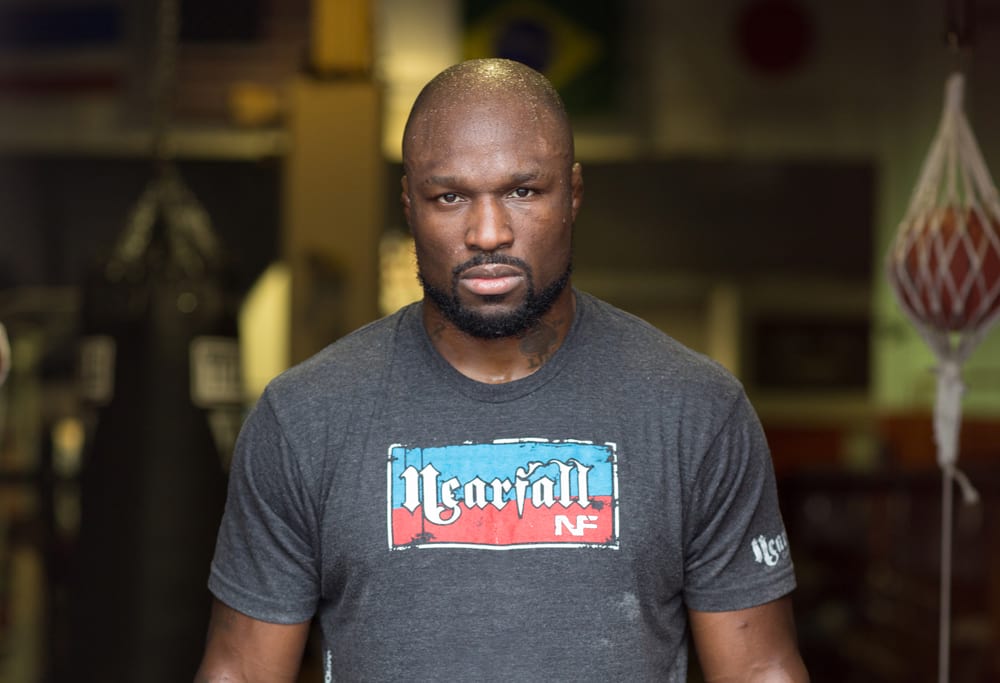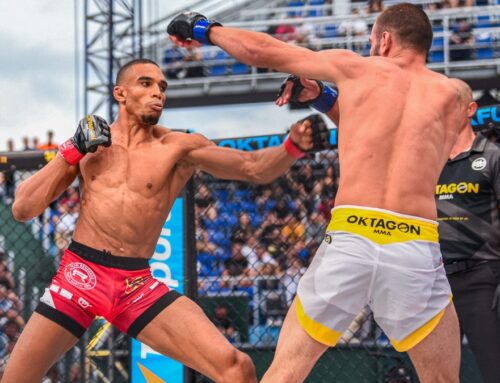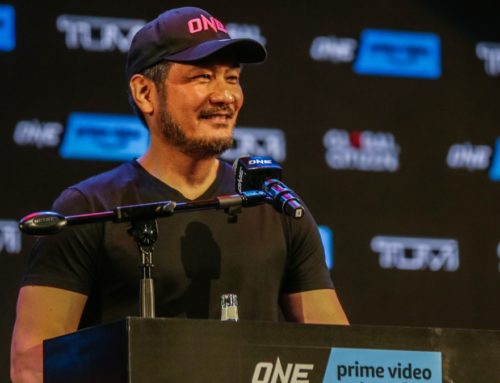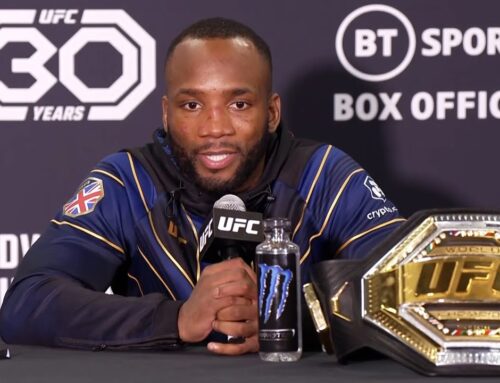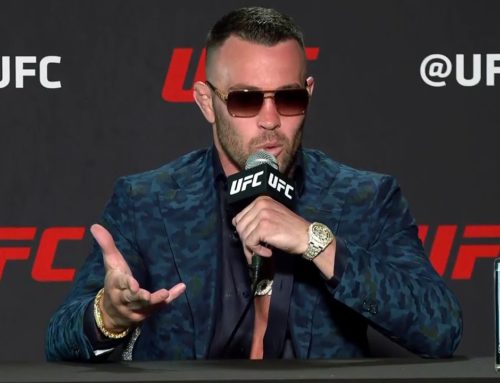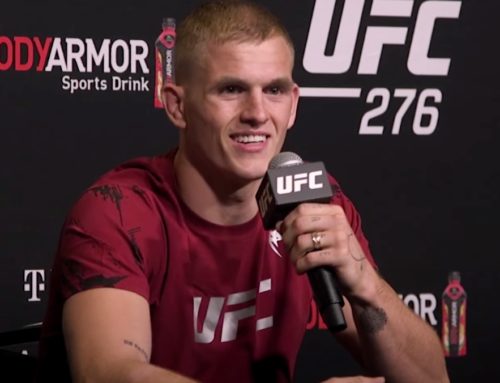Racism exists in mixed martial arts and Muhammed ‘King Mo’ Lawal is not afraid to speak up about it, as Fighters Only’s Gareth A. Davies found out.
Q: You have always spoken out about how fighters are projected in MMA. Why is that?
Muhammed Lawal: I keep it real. I might look bad, but at least I’m being honest. Other people are afraid to do it because they don’t want to be seen to be brash or arrogant. To me, it’s just being real. If Jon Jones had been real from the get-go he wouldn’t have this backlash he has now. He was too calculated. But he didn’t calculate it well enough because eventually it all came tumbling down. He tried to be something he isn’t. Some people get who we are, some don’t. I’ve found that now people are understanding me, nine or ten years into my career. At first it was, ‘I don’t like him, he’s cocky, he’s arrogant.’ But you never talked to me. When I meet people, they’re like, ‘Man, you’re cool, I thought you’d be a racist asshole.’ How’s that? You’ve never talked to me. I’m not racist at all.
Q: Is projection a dangerous thing?
ML: I had this tattoo on my shoulder while I was wrestling. I was ‘King Mo’ when I was wrestling. My boys said I was the king of the crowd so I should go by the name ‘King Mo’. I said yeah, that’s what’s up. A king ain’t just about royalty, it’s how you treat yourself. And others. I went to Japan and they were like ‘Mo, do you break dance? Do you rap? Drug deal?’ I said ‘No, I’m King Mo.’ They were trying to get me to do something stereotypical. I’m not doing that. They wanted me to play a character. It’s like 80s pro wrestling. They want guys who are either loved or hated. I said King Mo sounds better. A guy who is fun-loving, outgoing, and likes to fight.
Q: What was growing up like for you?
ML: I grew up in Richmond, Kentucky. My mum was a foreigner. She came from Nigeria. She’s a Muslim. We lived in the hood. We went from there to a trailer park. We lived all over. We were broke. I didn’t start doing sports until high school. You know, it was tough. I just know shit and I learned a lot about playing dumb (as a form of protection). People think I’m an idiot but I let them believe that. I ended up going to College at Oklahoma State.
Q: When did you start in MMA?
ML: I started in 2008. I went to Memphis, Detroit, Day County. There’s no MMA gyms there. You know how expensive it is to do MMA? It’s like a middle-class suburban sport. Most black fighters came through from wrestling. They were like, ‘Hey, you can train with us. Wrestling is mostly a white thing at college. Most who do it or go to wrestling events are like Donald Trump boys.
Q: What did wrestling prepare you for?
ML: Wrestling was all about hard work and dedication, being hard-nosed and aggressive. That’s the main thing you learn. Embracing the grind. That was a white boy thing. Growing up we look at Rocky. Apollo Creed was the finesse guy; quick and athletic. Rocky was the hard worker. He ran eight miles. He drank the egg yolk. He was in the meat locker room punching the meat. He put in hours whereas Apollo Creed was just natural. They said chocolate melts. You put pressure on them, black people fade and melt.
Q: Do African-American fighters have to struggle more?
ML: Everyone’s hard work will get you there but my momma told me that, as I’m black, I will need to work harder than the average person to get where I want to get to. Hard work can get you somewhere but we can do hard work and still be stuck. We’ve got to work harder and smarter than them. We’ve got to be extraordinary just to be looked at as ordinary. There’s no such thing as racism, only the human race. That’s what they’ll say. They’ll try and discredit it. Look at Khabib (Nurmagomedov). You telling me you’ve got to win 11 straight fights before you get a title shot? Yoel Romero is another one.
Q: Would you encourage others to speak out? Will it make a fighter’s following stronger and the sport more transparent?
ML: Muhammad Ali spoke out but he was looked at and hated. The most he was loved was when he started losing his voice. The moment he lost his voice he started slowly winning people over – right towards the end of his career. Now everybody loves him. But the people who were chanting Ali now weren’t chanting back then. It’s crazy how a lot of athletes who are icons now are even more iconic once they lose their ability to speak or do what they once did.
Q: Is there a difference with the way race is viewed and treated in boxing and MMA?
ML: Boxing is a poverty sport. I can rent out a storage unit and get a carpet and four cinder blocks and a pole and tie ribbon around all four of them and say that’s my ring. I can get a heavy bag and I can get a rope and do the slip rope stuff. I can purchase a double end bag. Hey, that’s a boxing gym. We open two hours of the day in a storage center. You guys need gloves? I’ll find some cheap gloves. If anyone leaves their gloves behind next time I’ll give you those gloves. Headgear? Not a problem. Mouth piece? Not a problem. Shoes? Just wear tennis shoes. For MMA you need shin guards, gloves, MMA gloves, a gi if you grapple, head gear, a mouth piece and somebody to teach you jiu-jitsu, which ain’t cheap, and somebody to teach you kickboxing, which ain’t cheap, and somebody to teach you wrestling, which ain’t cheap. Boxing is one art. One person can teach you the footwork, jabs, slips – all that.
Q: Have you experienced racism?
ML: I’ve been places in America where I approach people and they hold their purse or say, ‘Hey, what do you want?’ Sometimes if I go certain places I check that my pants aren’t sagging and that I’m walking slow and calm and talking very properly so I don’t seem gangster in their eyes. I say, ‘Hi, my name is Mo, nice to meet you.’ There have been times I’ve walked into a store and checked things out and they’ll go, ‘Hey come here!’ They accuse me of stealing something and contact security. They’ll have me lift my shirt up and pat me down. That’s happened a few times.
Q: What would you like to see change?
ML: They should try and have fighters go into the inner city and teach MMA. If we do that, the people will be exposed to it. They can meet a black dude from the north or a white dude from Portland, Oregon. They can be like, hey, these guys aren’t much different. They grew up in a single parent home and have been through the grind before. We all have our own type of grind. I’ve met some white boys from Kentucky and Tennessee and they’re looked down upon as hillbillies by middle-class people. The best thing for them to do is have rec centers and seminars in 25 rural towns or cities. Do some type of exchange. That’s the best way to create exposure.
Q: What impact do you see that having?
ML: When you do that we have a new generation of MMA fighters who have been exposed to other types of people and realized we’re all the same. We can all do arm-bars and triangles. If we get touched on the chin we all go to sleep. If we get put in a rear-naked choke we can all pass out or tap out. We’re going to train together and train smart and we’re going to learn and grow this sport. Right now, MMA is a middle-class, rich man’s sport. In order to learn and become a fighter, if you’re poor, you have to have some type of trade or come from Brazil or Russia. You have to be good at some type of grappling or striking form to be able to train at an MMA gym for free. They call it trade. But if we can start grass roots in certain poor areas we can build it up so that everybody has a chance. It won’t ever be equal because not everybody has the money, but we can spread it to people who don’t.
Q: What do you urge fighters to do?
ML: All fighters should speak out on what they see and experience. At the same time, speak out and be real about it. Don’t sugar-coat or lie about anything. There are a lot of people who think they see one thing but it’s not what they see. They have to be educated on what they speak on. Color and racism has been involved in combat sports since the beginning of time. Nationality, race, double standards, stereotyping. It’s all been part of combat sports. If you’re black, we’re just good athletes. We’re not smart. We’re brash, flamboyant. It’s never positive. You never hear someone say Tyron Woodley’s a smart fighter. It’s explosive, fast, savage. It’s never anything to do with skills. You might hear that about Floyd (Mayweather) but it’s followed by, ‘He’s boring, though.’ Vasyl Lomachenko is doing the same thing Floyd’s doing but he’s the best thing since sliced bread. It’s double standards.
Q: Do you think it is ignored?
ML: Ears need to be willing to listen. The minute you bring up race they say you’re race-baiting or playing the race card. I don’t think the world is racist. I think racism exists. Some people have never experienced racism. They have never seen people being mistreated because of race. It’s not that those people don’t believe it, they are just ignorant to the fact because they’ve never seen it. It is uncomfortable and weird to talk about, but it can’t be swept under the rug. Individuals who have not experienced it can’t be so closed minded to think it doesn’t exist.
Q: Would you like to see things change in the community from the MMA world?
ML: They don’t do a job promoting MMA in the black community. They just want PPV buys. It’s up to us to go back and start up those gyms. It’s our job. I went to Memphis and talked to coaches at Memphis BJJ. It’s on the outskirts but it’s in Memphis where people can get there. I said I’ll teach some seminars there. Whoever shows up, I’ll spar and everything. I was there for a week. I’m going to Detroit – Holland Park – which is probably the worst part. You’ve got to give back.
*** This feature first appeared in the June 2017 issue of Fighters Only magazine ***

